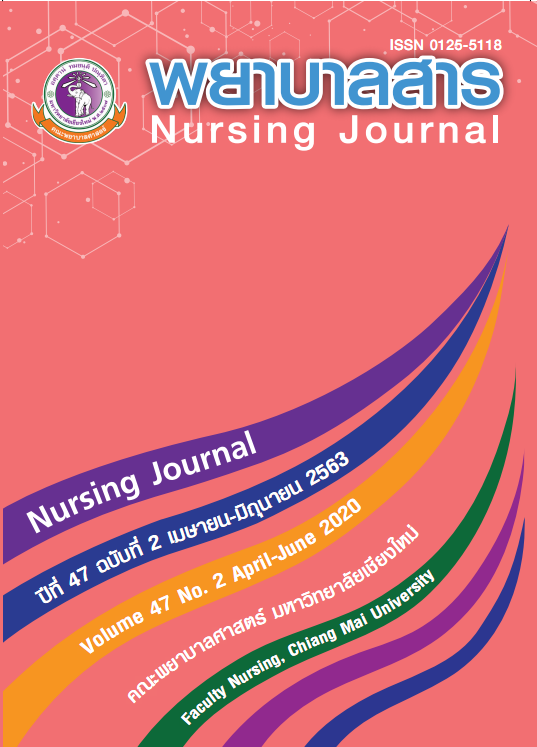Factors Predicting Practices in Prevention of Drug Resistant Organism Transmission Among Registered Nurses in Regional Hospitals
Keywords:
Predicting Factors, Practices, Prevention of Drug Resistant Organism Transmission, Registered Nurses, Regional HospitalsAbstract
Drug resistant organism infection is a major global health problem which severely affect patients. It is necessary to effectively prevent the transmission of drug resistant organism. This study aimed to determine practices and factors predicting the practices of registered nurses in the prevention of drug resistant organism transmission. The samples included 441 Registered Nurses working in the medical and surgical department of three regional hospitals under the Ministry of Public Health. Data were collected using a self - administered questionnaire developed by the researcher, which consisted of five parts: personnel information, knowledge, attitudes, support, and practices in prevention of drug resistant organism transmission. The response rate was 75.7%. Data were analyzed using descriptive statistics and stepwise multiple regression analysis.
The results showed that 70.0% and 58.7% of samples had a good level of knowledge and very good attitude towards the prevention of drug resistant organism transmission, respectively. Eighty six percent reported that they received very good support. Eighty eight percent had very good practice. Knowledge, attitude and support could predict practices in the prevention of drug resistant organism transmission at 21.1% (p<.05).
The organization should continuously educate Registered Nurses on up-to-date evidence-based prevention of drug resistant organism transmission so that their practices in the prevention of drug resistant organism are more effective.
Key words: Predicting Factors, Practices, Prevention of Drug Resistant Organism Transmission, Registered Nurses, Regional Hospitals
References
Bearman, G. M., Marra, A. R., Sessler, C. N., Smith, W. R., Rosato, A., Laplante, J. K., ... Edmond, M. B. (2007). A controlled trial of universal gloving versus cont act precautions for preventing the transmission of multidrug-resistant organisms. American Journal of Infection Control, 35 (10), 650-655.
Creamer, E., Dorrian, S., Dolan, A., Sherlock, O., Fitzgerald-H ughes, D., Thomas, T., ... Rossney, A. S. (2010). When are the hands of healthcare workers positive for m ethicillin-resistant Staphylo-coccus aureus?. Journal of Hospital Infection, 75 (2), 107-111.
Datta, R., Platt, R., Yokoe, D. S., & Huang, S. S. (2011). Environmental Cleaning Intervention and Risk of Acquiring Multidrug-Resistant Organisms from Prior Room Occupants. Archive Internal Medicine, 171 (6), 491-494.
D?az, R. I., & Cabrera, D. D. (1997). Safety climate and attitude as evaluation measures of organizational safety. Accident Analysis & Prevention, 29 (5), 643-650.
Elaziz, K. A., & Bakr, I. M. (2009). Assessment of knowledge, attitude and practice of hand washing among health care workers in Ain Shams University hospi tals in Cairo. Journal of Preventive Medicine and Hygiene, 50(1), 19-25.
Furuno, J. P., Perencevich, E. N., Johnson, J. A., Wright, M. O., McGregor, J. C., Morris Jr, J. G., & Hebden, J. N. (2005). Methicillin-resistant Staphylococcus aure us and vancomycin-resistant enterococci co-colonization. Emerging Infectious Diseases, 11 (10), 1539-1544.
Hosseinialhashemi, M., Kermani, F. S., Palenik, C. J., Pourasghari, H., & Askarian, M. (2015). Knowledge, attitudes, and practices of health care personnel co ncerning hand hygiene in Shiraz University of Medical Sciences hospitals, 2013-2014. American Journal of Infection Control, 43(9), 1009-1011.
Jia, X. Q., Pang, F., Chen, J. Z., & Jiang, L. X. (2015). Prevalence et distribution clinique des bacteries multi-resistantes (3537isolats) dans un hopital chino is tertiaire (janvier 2012–decembre 2013). Pathology Biology, 63 (1), 21-23.
Krejcie, R. V., & Morgan, D. W. (1970). Determining Sample Size for Research Activities. Educational and Psychological Measurement, 30 (3), 607-610.
Kristensen, M. S., Wernberg, N. M., & Anker-Moller, E. (1992). Healthcare workers risk of contact with body fluids in a hospital: the effect of complying with the universal precautions policy. Infection Control & Hospital Epidemiology, 13 (12), 719-724.
Polit, D. F., & Beck, C. T. (2004). Nursing research: Principles and methods. Philadelphia: Lippincott Williams & Wilkins.
Rogers, B. A., Havers, S. M., Harris-Brown, T. M., & Paterson, D. L. (2014). Predictors of use of infection control precautions for multidrug resistant gram-negative bacil li in Australian hospitals: Analysis of a national survey. American Journal of Infection Control, 42 (9), 963-969.
Schwartz, N. E., (1975). Nutritional knowledge, attitude, and p ractices of high school graduates. Journal of The American Dietetic Association, 66 (1), 28-31.
Seibert, D. J., Speroni, K. G., Oh, K. M., DeVoe, M. C., & Jacobsen, K. H. (2014). Preventing transmission of MRSA: a qualitative study of health care workers’ attitudes and suggestions. American Journal of Infection Control, 42 (4), 405-411.
Siegel, J. D., Rhinehart, E., Jackson, M., Chiarello, L., & Heal thcare Infection Control Practices Advisory Committee. (2007). Management of multidrug-resistant o rganisms in health care settings, 2006. American Journal of Infection Control, 35 (10), S165-S193.
Sumpradit, N. (2015). Situation and multidrug management in Thailand. Bangkok: Graphic design. (In Thai)
Trilla, A., Vaqu?, J., Rosell?, J., Salles, M., Marco, F., Prat, A., ... Asenjo, M. A. (1996). Prevention and control of nosocomial infections in Spain: current problems and future trends. Infection Control & Hospital Epidemiology, 17 (09), 617-622.
Downloads
Published
How to Cite
Issue
Section
License
บทความที่ได้รับการตีพิมพ์เป็นลิขสิทธิ์ของวารสารพยาบาลสาร
ข้อความที่ปรากฏในบทความแต่ละเรื่องในวารสารวิชาการเล่มนี้เป็นความคิดเห็นส่วนตัวของผู้เขียนแต่ละท่านไม่เกี่ยวข้องกับมหาวิทยาลัยเชียงใหม่ และคณาจารย์ท่านอื่นๆในมหาวิทยาลัยฯ แต่อย่างใด ความรับผิดชอบองค์ประกอบทั้งหมดของบทความแต่ละเรื่องเป็นของผู้เขียนแต่ละท่าน หากมีความผิดพลาดใด ๆ ผู้เขียนแต่ละท่านจะรับผิดชอบบทความของตนเองแต่ผู้เดียว






